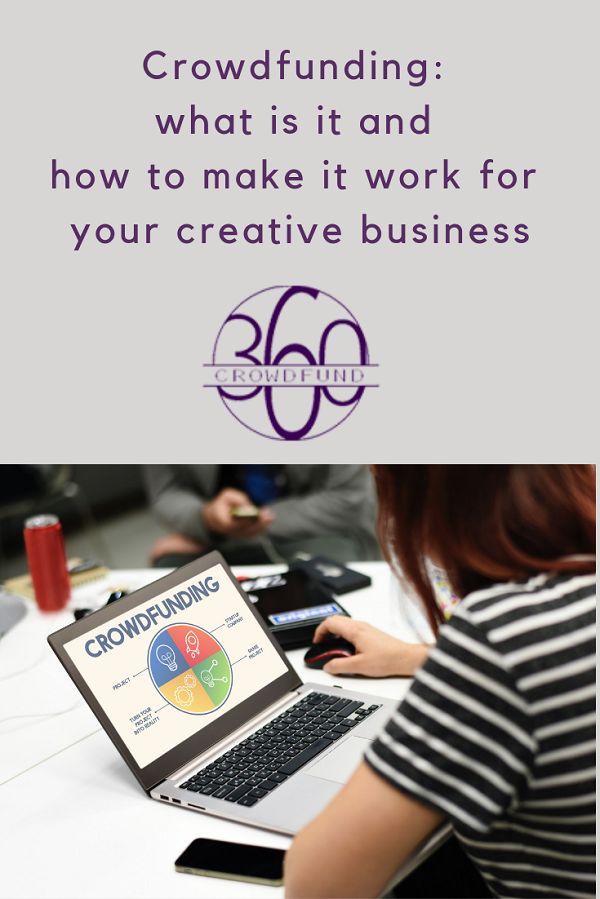Crowdfunding: what is it and how to make it work for your creative business
We recently met Jes from Crowdfund 360 at a One Girl Band coffee morning in Brighton. We didn’t know much about crowdfunding, what it was and if it was possible to use crowdfunding for small businesses. We were fascinated and keen to learn more so asked her to educate us!
PIN FOR LATER

You may have heard the term crowdfunding or Kickstarter or Crowdcube or Crowdfunder be used more and more recently, but if you aren’t quite sure what it is or why people do it. Don’t worry. You aren’t alone! This article is hopefully going to change that.
Firstly, what is crowdfunding? As the name suggests, it is the process of getting funded by the crowd. But it is not just that, the definition is a little more specific. Crowdfunding is the process of getting a large number of people to fund a specific project in a specific time period. The time-bound element is really important here because we all know people who say, ‘I’ll give you money next week’ but next week never comes right?
**TIP** the best length for a campaign to have the highest chance of success is 5 weeks. Any less, people may be on holiday and miss it, any more and you will get bored of asking for money, and your audience bored of being asked.
You might be thinking, why would random people give me or my business money? And yes, that’s true… they won’t… unless they a) get something out of it or b) feel connected to you or your business.
**TIP** The first 30% of the funding needs to come within the first few days from your friends and family, so others who are less connected to your business believe that this is a project other people support and they should join this crowd as to not miss out.
This leads onto the types of crowdfunding. For businesses, there are two main types of crowdfunding to consider. Rewards or Equity.
Rewards Crowdfunding
For rewards crowdfunding you are expected to give away your product in return for the support, thus using crowdfunding to bring in money and customers. Essentially this is the same as pre-sales. The difference being, you would have around 7 different pledge values going up in value from £5 where you just thank the backer, up to perhaps £2,000 where there is an exclusive one of a kind experience-style reward or a stockist reward.
**TIP** the average pledge on a rewards crowdfunding campaign is £25 so make this reward the most appealing.
Your business can be at any stage with rewards crowdfunding, but the more developed your idea the more trustworthy your campaign and the more likely you will be to succeed. Rewards crowdfunding campaigns can attract either a local audience if you use a British platform like Crowdfunder, or a global audience if you use a global platform like Kickstarter or Indiegogo
.
**TIP** Offer free shipping to your primary target audience’s country but include this in the cost of reward so you do not lose out.
Rewards Crowdfunding campaigns tend to raise between £5-100k however some go on to raise much more than that due to a high ad spend.
**TIP** In rewards crowdfunding you can choose either an all-or-nothing or a take-what-you-make model. The first means if you don’t reach your target you go home with £0, the second means you take however much money you make.
Equity Crowdfunding
Equity crowdfunding is much more regulated than rewards crowdfunding. For equity crowdfunding, your business already needs to be trading and your financial projections need to be strong and truthful. Investors will be investing in your business to see a large return on their investment over the next few years. The downside of equity crowdfunding is that you cannot reach out to a global audience the way that rewards campaigns can and you the people who back you will most likely not be your target customers. You will also need to develop much stronger connections with the investors ahead of the launch. However, in equity crowdfunding most raises range from £100k-£1million.
**TIP** If you are crowdfunding for a website, app or for business expansion, equity crowdfunding is much easier than rewards.
There are two main platforms to look at for equity crowdfunding in the UK, Seedrs and Crowdcube.
**TIP** Equity crowdfunding is all-or-nothing meaning if you do not reach your target you go home with £0 for that reason we recommend having at least 60% secured before launch.
For the majority of people, it makes the most sense to first run a smaller rewards campaign to bring in customers then once you have figured out what works, you can then go on to launch an equity campaign, knowing you’re more likely to succeed.
Although the above seems that crowdfunding just brings in money and customers/investors. Crowdfunding brings in much more. Because no one will ‘randomly’ find your campaign and give you money, your success is linked very much to the effort you put in to reach a wide audience. To run a successful campaign you need to combine social media marketing, email marketing, PR, events, phone calls and meetings to bring in enough people to support your campaign.
**TIP** Divide the amount you want to raise by £25 (average pledge) to work out how many backers you need. Then aim to have your mailing list/social media following at least quadruple this.
Make A Plan
Regardless of the type of crowdfunding and platform, the process of how to run a successful campaign is the same. Crowdfunding is a mix of science, creativity and audience psychology.
Here is the plan we follow with our clients:
You firstly need to plan your time and develop the relationships with your audience as well as create all the content you will need
**TIP ** We recommend a minimum of 8 weeks preparation time, working a minimum of a day a week on this, however, the more you want to raise, the more you should work on this.
You will then need to ensure your crowd is big enough. You should aim to have a well-defined target audience, have connected with them and engaged with them before you ask for money.
**TIP** Look to your own networks first to see how they can help and open your networks further. Cold emailing never works and is not allowed by GDPR.
You will then need to work on and decide the messaging you will tell your audience, in both written, visual and video format.
**TIP** Try out different messages before you launch your crowdfunding campaign to see which works best with your audience. In all messaging, be honest, friendly and positively emotive.
Once you have decided your messaging you will then need to create your crowdfunding project page on the platform of your choice
**TIP** To make the best page for your audience, take a look at how similar campaigns that were very successful were laid out and follow the similarities.
Simultaneously to above you should be planning and creating your marketing for the crowdfunding campaign. Normally, we work on having a 3 weeks pre-campaign warm up, plus 5 weeks crowdfunding campaign, we estimate this will be around 11 emails, 60 Facebook posts, 168 twitter posts, 2 press releases as well as numerous personal messages.
**TIP** This content has to be creative to stand out from the crowd. When creating the content, always think, what does my audience want to see/hear/share? Make your audience aware of the different elements of your project, engage them with, make them feel part of a community as well as asking them to support you.
How Crowdfunding 360 can help ‘crowdfunding for small businesses’
Many people try to do all this alone and it is possible to run a successful campaign with no assistance, however, when juggling running a business, having a life and managing this, it is easy to see that many people get overwhelmed by the stress. Only 21% of people in the UK who run a crowdfunding campaign reach their target. However, at Crowdfund 360 it is our business to remove as much of that stress as possible and ensure you only focus on working on what we know works. 83% of our clients who run a crowdfunding campaign go on to surpass their financial goal.
We run an 8 week online training course to teach you all the skills you need to run a successful crowdfunding campaign. Clients who have taken this have gone on to raise between £2 and £35k.
We also work with clients in a full project management capacity to provide personalised strategy and content. This is perfect for clients looking to raise over £15k. Our clients have raised between £15k and £800,000 with this option.
For more info and to find out if they could help you. Please check out www.crowdfund-360.com and get in touch using the form online.




